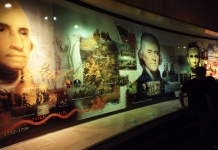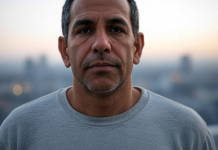Charlie Kirk (Charles James Kirk) was born on October 14, 1993 in Arlington Heights, Illinois. He was a producer and writer, known for Identity Crisis (2025), Border Battle (2022) and Race War.
Early Life and Education
He grew up in nearby Prospect Heights in a middle-class family. His father was an architect specializing in luxury estates, while his mother worked as a trader at the Chicago Mercantile Exchange before transitioning to mental health counseling.
Kirk attended Wheeling High School, where classmates later described him as “rude,” “arrogant,” and possessing a “superiority complex,” though he was politically active from a young age, inspired by conservative figures like Ronald Reagan. A self-described “Reagan-loving schoolboy,” Kirk skipped college after one semester at Harper College, opting instead to pursue activism full-time.
Rise in Conservative Activism
Kirk’s political career ignited in high school when, at age 18, he co-founded Turning Point USA (TPUSA) in 2012 with Bill Montgomery. The nonprofit aimed to mobilize young conservatives on college campuses, promoting free-market principles and countering what Kirk called “leftist indoctrination.” Under his leadership as executive director and CEO, TPUSA grew rapidly, establishing over 3,000 chapters by 2025 and raising millions in funding from donors like the Koch brothers and Foster Friess. Kirk’s “Professor Watchlist,” launched in 2016, targeted academics accused of liberal bias, drawing both praise from the right and criticism for stifling free speech.
He became a key ally of Donald Trump during the 2016 election, organizing voter turnout among young Republicans and befriending Donald Trump Jr. Kirk spoke at the Republican National Convention that year and played a role in Trump’s 2020 campaign through TPUSA’s Turning Point Action arm, a dark-money group that funneled resources to pro-Trump efforts. His influence extended to events like the January 6, 2021, Capitol rally, where TPUSA was accused (though denied) of funding bus travel for attendees. Critics, including some conservatives, labeled Kirk an “anti-Semite” due to associations with figures like Milo Yiannopoulos and events that attracted alt-right crowds post-Charlottesville.
Media Career and Influence
By his mid-20s, Charlie Kirk had become a media powerhouse. In October 2020, he launched The Charlie Kirk Show, a daily three-hour radio program syndicated on Salem Media Group’s “The Answer” network. The podcast surged in popularity, reaching 500,000–750,000 daily downloads in 2024 and ranking as the 21st-most popular on Apple Podcasts by late 2021. His “Turning Point Live” streaming show targeted Generation Z, amassing 111,000 monthly unique visitors by 2021.
Kirk authored several books, including Time for a Turning Point (2016) and The MAGA Doctrine (2023), blending conservative policy critiques with calls for Christian nationalism. He produced documentaries like Identity Crisis (2025) and Border Battle (2022), focusing on election integrity and immigration. By 2025, Kirk was a millionaire, with TPUSA’s annual revenue exceeding $100 million, and he was seen as Trump’s “ambassador to youthful conservatives.” His campus tours, like the “American Comeback Tour,” often sparked protests but amplified his reach.
Personal Life
Kirk married Erika Frantzve, a former Miss Arizona USA and collegiate basketball player pursuing a doctorate in Biblical studies at Liberty University, in 2021. The couple had two young children: a son (born May 2024) and a daughter (born August 2022). Erika often appeared alongside Kirk at events, and they shared glimpses of family life on social media, emphasizing faith and patriotism. Kirk was a devout Christian, frequently invoking the Gospel in his rhetoric.
Assassination and Immediate Aftermath
On September 10, 2025, at age 31, Kirk was fatally shot during a TPUSA speaking event at Utah Valley University in Orem, Utah, as part of his “American Comeback Tour.” The assailant, 22-year-old Tyler Robinson — a Utah resident with no prior public political ties — fired a long rifle round from atop a nearby building, striking Kirk in the chest and neck. Kirk was pronounced dead at the scene despite immediate medical intervention. Robinson fled but surrendered peacefully two days later on September 12, after confessing in text messages to a roommate and expressing fear of police retaliation. DNA evidence and planning texts linked him to the crime; prosecutors charged him with capital murder, citing aggravating factors like endangering bystanders, and announced plans to seek the death penalty — Utah’s first potential execution in over 15 years.
The FBI offered a $100,000 reward during the manhunt and released images of Robinson as a person of interest. President Trump, a close ally, mourned Kirk on Truth Social as “the Great, and even Legendary” voice of American youth, announcing a posthumous Presidential Medal of Freedom and plans to attend his Arizona funeral. Vigils sprang up nationwide, from Utah campuses to Illinois parks, with American flags and candles honoring Kirk.
Broader Impact and Legacy
Charlie Kirk’s assassination on September 10, 2025, cemented his status as a polarizing figure in American politics, amplifying both his influence and the controversies surrounding him. For supporters, Kirk was a martyr for conservative values, galvanizing a new generation of activists. Turning Point USA saw a surge in engagement, with 37,000 new chapter requests, his books topping Amazon charts, and The Charlie Kirk Show podcast hitting number one on Apple Podcasts. Conservative leaders, including Donald Trump, hailed him as a patriotic voice for youth, awarding him a posthumous Presidential Medal of Freedom. Vigils and tributes across the U.S., from Utah to Illinois, underscored his role in mobilizing young Republicans and promoting free-market principles and Christian values.
Critics, however, viewed Kirk’s legacy through a more critical lens, pointing to his divisive rhetoric and associations with controversial figures. Outlets like The Nation and The New Republic highlighted his ties to Christian nationalism, his role in events attracting alt-right elements, and statements critics labeled as inflammatory on issues like race, immigration, and LGBTQ+ rights. They argued his “Professor Watchlist” and campus confrontations stifled academic freedom, while his proximity to figures like Milo Yiannopoulos and events post-Charlottesville raised questions about enabling extremism. Some saw his death as a tragic consequence of the polarized climate he helped fuel, though they condemned the violence unequivocally.
Both sides acknowledged Kirk’s outsized impact. His ability to blend media savvy, grassroots organizing, and proximity to power — evident in his Trump alliance and TPUSA’s $100 million operation — reshaped conservative youth activism. Yet, his death also sparked broader debates about political discourse, free speech, and the risks of radicalization in a divided nation. Supporters launched initiatives like the “Charlie Kirk Data Foundation” to honor his mission, while critics called for reflection on the consequences of inflammatory rhetoric. Kirk’s life and death thus left a dual legacy: a rallying cry for the right and a cautionary tale for those seeking to bridge America’s deepening divides.







